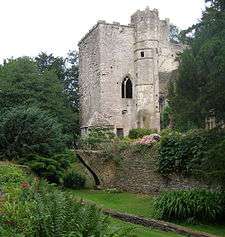Sir William Hicks, 1st Baronet
Sir William Hicks, 1st Baronet (1596 – 9 October 1680), of Beverston, in Gloucestershire, and of Ruckholt, at Leyton in Essex, was an English Member of Parliament.
Sir William Hicks Bt MP | |
|---|---|
 Beverstone Castle, Gloucestershire | |
| Born | 1596 |
| Died | 9 October 1680 |
| Alma mater | Trinity College, Cambridge |
| Occupation | Aristocrat, merchant, politician |
| Spouse(s) | Margaret Paget |
| Children | 4 sons, 4 daughters |
| Parent(s) | Sir Michael Hicks Elizabeth Coulston |
| Relatives | William Paget, 4th Baron Paget de Beaudesert (father-in-law) |
Early life
William Hicks was born in 1596. He was the son of the wealthy courtier Sir Michael Hicks, who was secretary to Lord Burghley during the reign of Queen Elizabeth, and wife Elizabeth Coulston; Burghley was his godfather, and he was named William in Burghley's honour. He inherited a substantial estate, including Beverstone Castle, on his father's death in 1612, and on 21 July 1619 was created a baronet.
It is said in the Dictionary of National Biography that he was educated at Trinity College, Cambridge, though this is not confirmed by the Venn reference work on Cambridge graduates.[1]
Career
Hicks served in two Parliaments as member for Great Marlow, that of 1625–6 and once more in the Short Parliament of 1640. During the Civil War he was a staunch Royalist, and saw action at the Siege of Colchester in 1648, as a result of which he was imprisoned for several weeks.
Personal life and death
He married Margaret Paget (born c. 1604 – buried 10 September 1652), daughter of William Paget, 4th Baron Paget de Beaudesert, and Lettice Knollys, and they had a number of children:
- Baptist, who died young
- Elizabeth, who died young
- Sir William Hicks (1629–1703), who succeeded to the baronetcy
- Letitia Hicks, who married Arthur Chichester, 1st Earl of Donegall
- Catherine, who died young
- Francis, who died young
- Sir Michael Hicks, whose line inherited the baronetcy after the death of the last of his brother's descendants, and from whom the Earls St Aldwyn are descended
- Elizabeth, who died young
Hicks died on 9 October 1680. He was buried at Leyton Parish Church where his monument records "his loyalty to King Charles in the Great Rebellion".[2]
References
- Leigh Rayment's Peerage Pages
- Edward Kimber & Richard Johnson, The Baronetage of England (London, 1771)
- Lee, Sidney, ed. (1891). . Dictionary of National Biography. 26. London: Smith, Elder & Co. (Article on his father.)
- Willis, Browne (1750). Notitia Parliamentaria, Part II: A Series or Lists of the Representatives in the several Parliaments held from the Reformation 1541, to the Restoration 1660 ... London. p. 1.
Notes
- "Hickes, William (HKS559W)". A Cambridge Alumni Database. University of Cambridge.
- Davison, Alan; Coates, Ben. "HICKS, Sir William, 1st Bt. (1596-1680), of Beverstone, Glos.; Ruckholts, Low Leyton, Essex and Austin Friars, London". www.historyofparliamentonline.org. The History of Parliament Trust. Retrieved 11 July 2020.
| Baronetage of England | ||
|---|---|---|
| New creation | Baronet (of Beverston) 1619–1680 |
Succeeded by Sir William Hicks, 2nd Baronet |